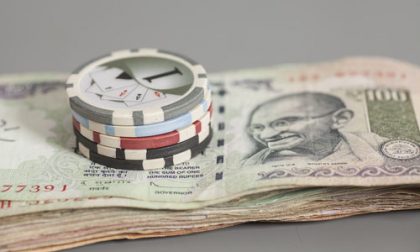Online Poker Tale Lurks in Odd Arrest of Goldman Sachs India VP
One of the most unusual problem-gambling stories in recent memory involves a senior official at global investment giant Goldman Sachs office in Bengaluru, India, being arrested over a hapless embezzlement scheme totaling Rs 38 crore (about US $5.4 million), all to pay off what Indian news sources report to be the equivalent of a US $70,000 online-poker debt.
If it sounds like online poker is being made into a bogeyman here, well, wait… there’s a lot more. There are a number of things in this tale that just do not add up as presented. But, lede now well and intentionally buried, let’s begin with the basics.
Goldman Sachs India Vice President of Settlements Ashwani Jhunjhunwala on September 9 after orchestrating the transfer of the $5.4 million from a settlement reconciliation account controlled by Goldman Sachs. Jhunjhunwala sent the funds to a Hong Kong-based entity called Synergy Wisdom Limited, held with the Hong Kong branch of the Industrial and Commercial Bank of China (ASIA).
The actual theft occurred just three days earlier, on Friday, September 6. Jhunjhunwala took advantage of three junior employees in the division under Jhunjhunwala’s control. Investigators quickly identified three junior workers — Gaurav Mishra, Sujith Appaiah, and Abhishek Yadav — who had compared notes and discovered that each was then being sent away from their computers to run errands (such as fetching food) while Jhunjhunwala “reviewed” their work.
In reality, Jhunjhunwala was using their employee-analyst accounts to swipe the money from the GS reconciliation fund and ship it to Hong Kong. Mishra was the one who first discovered unknown transactions run through his account, and the investigators soon determined, via security footage, that it was actually Jhunjhunwala tapping the keys.
The hapless scheme unraveled so fast that Goldman Sachs was able to reverse the $5.4 million in transferred funds before it disappeared via another transfer within the Hong Kong bank. Jhunjhunwala was, as one would expect, arrested, and he’ll face at least four serious counts, including criminal breach of trust by clerk or servant, criminal breach of trust by banker, and cheating by impersonation. A lengthy prison term appears likely.
But wait, there’s a lot more. Authorities quickly determined that Jhunjhunwala, 36, had orchestrated the scheme with the help of a former assistant of his at Goldman Sachs, Vedant Rungta. Rungta, 28, had been dismissed from his role at Goldman Sachs for some sort of squirrelly conduct, which reports don’t detail, but Rungta was described as a “wealthy individual” who remained in contact with Jhunjhunwala.
Jhunjhunwala, seemingly, was far from wealthy himself. In fact, he was deeply in debt. The India-based reports claim that Jhunjhunwala needed cash to pay his debts, supposedly to clear those online-poker debts. Here’s this, from the International Business Times:
“Investigation revealed that Jhunjhunwala, who has been working with the company for the past four years, committed the fraud after incurring massive financial losses worth $70,000 (Rs 50 lakhs) from playing online poker. Goldman Sachs has not responded to TOI’s inquiries on the scam.”
But wait… is there any “official” online-poker site in the world that lets a random player participate on credit and run up $70,000 worth of bad debt? If this was indeed online poker-related, then it had to be in the type of virtual underground games such as those run within China that have drawn significant heat from that country’s authorities. India has a growing population of online sites, but unless someone behind one of those sites is running an old Full Tilt Poker-style operation with plenty of funny money, the basic story being told here just doesn’t add up.
Here’s another poser: Why would someone steal $5.4 million just to settle a $70,000 debt? Right. There’s a lot more going on here than online poker, no matter what these official news stories claim.
What is known that Jhunjhunwala had deep money problems. Before contacting Rungta in July, Jhunjhunwala had obtained at least one previous bank loan, but had missed several interest payments. Rungta floated Jhunjhunwala the equivalent of a few thousand dollars before the two agreed on the much larger scheme, one that was doomed to faiure from the start.
It’s just an odd, odd tale, one where further developments may produce an entirely different take on what was really going on. Maybe the full tale will emerge one day, but this is just a few pieces of a much larger puzzle.


















COMMENTS